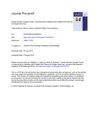 1 citations,
September 2010 in “The journal of investigative dermatology/Journal of investigative dermatology”
1 citations,
September 2010 in “The journal of investigative dermatology/Journal of investigative dermatology” The meeting highlighted major advances in skin research, including new findings on skin microbes, genetic links to skin diseases, and improved treatments for various conditions.
 June 2006 in “Experimental Dermatology”
June 2006 in “Experimental Dermatology” Understanding skin patterns can help us learn about skin diseases and their treatments.
1 citations,
December 2023 in “Molecules/Molecules online/Molecules annual” JAK inhibitors show promise for treating various skin diseases.
 July 2014 in “Disease-a-Month”
July 2014 in “Disease-a-Month” The document gives treatment advice for various skin conditions, like using metronidazole for perioral dermatitis and minoxidil for hair loss.
 19 citations,
May 1992 in “International Journal of Dermatology”
19 citations,
May 1992 in “International Journal of Dermatology” Some alternative vitiligo treatments show promise, but none are as effective as psoralens and UVA.
 March 2019 in “Dermatologic Clinics”
March 2019 in “Dermatologic Clinics” The document concludes that there have been significant advances in the treatment and diagnosis of various skin conditions.
 7 citations,
October 2019 in “Annals of palliative medicine”
7 citations,
October 2019 in “Annals of palliative medicine” New targeted cancer drugs can cause skin side effects, and managing them requires patient education and timely care.
January 2019 in “Journal of Cosmetics, Dermatological Sciences and Applications” The combination therapy is safe and effective for treating Female Pattern Hair Loss in Asian women.
November 2022 in “Frontiers in Medicine” PRP shows promise for treating mild alopecia areata but needs more research for cicatricial alopecias.
 1 citations,
October 2023 in “Indian dermatology online journal”
1 citations,
October 2023 in “Indian dermatology online journal” Many people use home remedies for skin conditions, but there's limited scientific evidence to support their effectiveness.
 2 citations,
January 2014 in “Springer eBooks”
2 citations,
January 2014 in “Springer eBooks” The book details skin conditions in older adults, their link to mental health, cancer treatment importance, hair loss remedies, and managing autoimmune and itchy skin.
90 citations,
April 2013 in “Dermatology online journal” Different treatments for Hidradenitis suppurativa range from antibiotics and hormonal therapies to surgery, depending on severity.

Injecting a person's own skin cells back into their skin is a promising, safe, and affordable treatment for skin disorders.
 January 2025 in “Clinical Cosmetic and Investigational Dermatology”
January 2025 in “Clinical Cosmetic and Investigational Dermatology” Pediatric alopecia areata is more immune-active than adult cases, suggesting age-specific treatments and potential use of JAK inhibitors.
 3 citations,
March 2020 in “Dermatology Research and Practice”
3 citations,
March 2020 in “Dermatology Research and Practice” Tracnil™, a mix of myo-inositol, folic acid, and vitamin D3, safely reduced acne, improved excessive hair growth, and fixed irregular periods in overweight women with PCOS.
2 citations,
February 2021 in “International Journal of Research in Dermatology” Minoxidil with PRP is the best treatment for hair loss.
 7 citations,
September 2013 in “Current Dermatology Reports”
7 citations,
September 2013 in “Current Dermatology Reports” Some skin medications are safe for pregnant women, but others pose risks or should not be used.
 3 citations,
August 2021 in “Cutis”
3 citations,
August 2021 in “Cutis” Some alternative medicine treatments might work for skin conditions, but their effectiveness and safety differ a lot.
 August 2023 in “Tzu Chi Medical Journal”
August 2023 in “Tzu Chi Medical Journal” Iron deficiency is the main cause of hair loss in women, and iron supplements started within 6 months can improve hair health.
 March 2014 in “Dermatologic Clinics”
March 2014 in “Dermatologic Clinics” More research, better treatments, and public education are needed for dermatological conditions in people of African descent.
 August 2018 in “Journal of The American Academy of Dermatology”
August 2018 in “Journal of The American Academy of Dermatology” Different treatments for skin conditions were found to be effective and generally safe, with biologics recommended as the first choice for generalized pustular psoriasis.
 466 citations,
August 2004 in “Journal of the American Academy of Dermatology”
466 citations,
August 2004 in “Journal of the American Academy of Dermatology” Rosacea is a skin condition with unclear causes, classified into four subtypes.
September 2015 in “Advances in small animal medicine and surgery” Deslorelin can help regrow hair in most intact male dogs with alopecia.
 34 citations,
August 2005 in “Dermatologic Clinics”
34 citations,
August 2005 in “Dermatologic Clinics” Stress and emotional factors can worsen skin conditions by affecting the immune system.

New treatments for skin conditions show promise, especially Coacillium® for hair growth in young people with alopecia areata.
1 citations,
July 2022 in “JEADV Clinical Practice” New and existing treatments for hair loss show promise, with some being more effective for men and others for women.
 5 citations,
August 2019 in “Journal of The American Academy of Dermatology”
5 citations,
August 2019 in “Journal of The American Academy of Dermatology” The document presents a new way to do skin treatments with a tool that lets you use microneedling and apply PRP at the same time with one hand.
 January 2019 in “Journal of Dermatology and Venereology”
January 2019 in “Journal of Dermatology and Venereology” Sesame and pumpkin seed oil can effectively regrow hair in alopecia areata.
 62 citations,
July 2018 in “Lasers in Medical Science”
62 citations,
July 2018 in “Lasers in Medical Science” LED therapy is safe and shows potential for treating skin conditions and promoting hair growth, but more research is needed.
January 2025 in “Journal of Aesthetic Nursing” Microneedling works better when combined with other treatments.





















